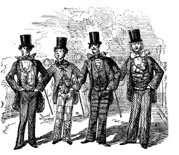
Who’s Afraid of the “New Breed” of Priests?
THE GENERATION GAP IN THE PRIESTHOOD
Over the past several years a stream of articles addressing the new “conservatism” among Catholic seminarians has seen publication in both the Catholic and secular press. Many of these have highlighted the widening generation gap between 1960s-style priests (i.e., those who are now in charge of most of the institutions in the Church) and their younger counterparts who, braving seminary straits, are emerging as faithful sons of the Church. Perhaps the most prominent article of this new genre was a New York Times Magazine cover article headlined “The Last Counterculture” (Apr. 4, 1999) — referring to the priesthood.
The response generated by such articles is more revealing than the articles themselves. Jeannette Batz, columnist for the liberal National Catholic Reporter, for instance, responded to the Times Magazine article quite passionately. In short, she was offended.
“Really good priests don’t live at a remove from culture,” Batz contended. Batz sees these young seminarians as scared little boys — “scared to watch TV or listen to James Taylor.” Are these seminarians really scared or might they manfully be seeking to avoid the temptations of the world, to lead lives more conducive to carrying out their ministry?
If a priest wants to preach against pornography, must he really immerse himself in peep shows, porn magazines, and phone sex lines? Does a priest need to participate in the unjust structures of the American business world before denouncing them from the pulpit?
You May Also Enjoy
Unlike the ideologies of both socialism and capitalism, the Church promotes a society in which all of life functions as a harmonious whole leading to Heaven.
Religious convictions are deep and can easily override considerations of beliefs that are contrary to them, even in light of attempts at objectivity.
Archbishop Sean O'Malley, in 2003, stated, "The Church presumes that each person is receiving in good faith. It is not our policy to deny Communion. It is up to the individual."

